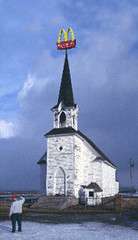"If people are shopping for faith, the megachurch fills up the shelves," writes Twitchell. "And since you can't generate brand loyalty on the basis of faith, you essentially do it on the basis of add-ons, on the basis of value added to affiliation, on the basis of providing convenient community." Following up that theme, Rob Walker describes Aurelio Barreto's conversion experience. "[H]e found Jesus; he shared the news about Christ with anyone who would listen. Eventually, however, he found another way to spread the word, which he says will be far more effective: retail."
The Sin the Republicans Forgot: While most rightwing Republicans can spot immorality a mile away--especially that of the sexual variety--one bona fide sin that doesn't seem to enter their collective consciousness is usury, charging a fee for lending money. Republicans in the Senate are working eagerly to ensure that credit card companies can expand profits and debt-strapped citizens have a harder time declaring bankruptcy. The measure before Congress--which would cut out protections for families and the elderly--operates under the presumption that bankruptcies have skyrocketed in recent years not because of a turbulent economy but because of chronic overspenders. How, then, to account for the 16,000 US soldiers who filed for court protection from their creditors? Or the fact that half of all personal bankruptcies are blamed on overwhelming medical expenditures and debilitating illness? The bill before Congress has been pushed by the credit card industry for eight years, and if it were not for Bill Clinton refusing to sign a version passed by the House and Senate on grounds it was unfair, it would be on the books now. But the momentum seems to be in the rightwingers favor this time around (you know Bush won't weigh in on the injustice of the proposal). Paul Krugman sums it up nicely:
Warren Buffett recently made headlines by saying America is more likely to turn into a 'sharecroppers' society' than an 'ownership society.' But I think the right term is a 'debt peonage' society - after the system, prevalent in the post-Civil War South, in which debtors were forced to work for their creditors. The bankruptcy bill won't get us back to those bad old days all by itself, but it's a significant step in that direction.

No comments:
Post a Comment